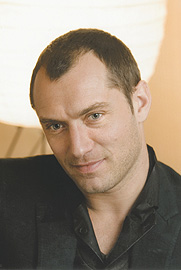HOME / 雑誌 / AERA English / ジュード・ロウ インタビュー
ジュード・ロウ インタビュー

| |

5月号掲載のジュード・ロウさんインタビューの一部をお届けします。音声ファイルのテキストもつけましたので、ご利用ください。
インタビュー 斉藤真紀子
|
|
|---|
Q: The roles you played before as I mention that there is always theme and complexity and I really you know even after I see that movie I sometimes think about you know why this character did this such a thing or, it's not something that it ends after the movie. I think about it. It sometimes lasts for a few days.
A:
I'm glad, I mean, that's to me that's what interests me about this job. But it's also what I love about my visits to the cinema and to the theatres when you come away you feel the piece you've seen has provoked a question in your head, you can't always figure out, and so I often feel the same, when I finished performing a role, you don't always know exactly what it is until you see it, because also a director can see something different and choose to portray something different.
Q: So for you movie making is continuity even after.
A:
Very much so, the journey, the process. It has to be. It's also the experience you have while making it. I mean, that's the experience you live with, memory of filming. But at the end, the film the journey isn't finished until the film is complete. And then it becomes finite, and it is you know but in a way you know you just said, there is a finite, there is a finished product, but the ideas it provokes continue and continue. It's beautiful really.
Q: And because you played versatile characters in many different ways, I wonder how you connect with then or if you think that this character is not me, then how to do it? I mean do you read books? Do you observe ordinary people? How do you get inspiration?
A:
It's a mixture. Never one thing. You know it's a journey of what is on the page, what is described on the page, what that makes your imagination create, what is this person thinking, what do they look like, what do they feel like, what do they sound like. You also have to make some kind of journey towards what the director wants. Because you may read it and think you know this character, the director says, no, no, no, I want to be like this, oh, oh, wow, ok, you then have to move towards that. And then it's the case of accumulating knowledge that you may don't have. And you mix the knowledge that you accumulate whether it's books, other films, watching people, watching animals, watching other performances, listening to the music, changing your body, either the loosing weight, putting on weight, putting on muscle, changing your hair, changing your voice, learning a new skill, whether it's how to hold the knife, or play the instrument, drive a car, or to write of the paint, and then also you have to mix that something in you, which is something you read, and you think, you know, I know that, I know that feeling. It's sometimes or I know the feeling all the time. Or I know the feeling a little bit, but I've been never before I'd like to understand it. Then you have to take that in a feeling which makes it you, you know, and you makes it true. And you have to mix that in.
Q: That's very interesting.
A:
That process is always different. How you put it together. Depending on what the part is, depend on who you're working with.
|
|
|---|
|
|